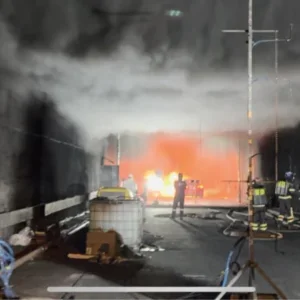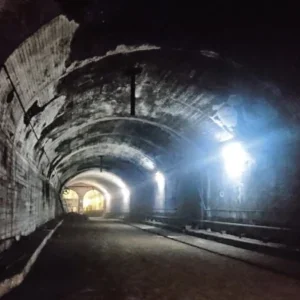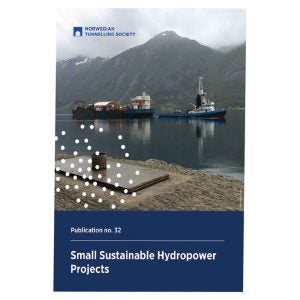Many of the myriad tunnelling projects that
construction group Acciona has underway internationally include TBM drives with a wide range of machines, geological challenges and sectors being served.
Ranging from recent long TBM drives in Norway and metro tunnelling in Ecuador, and current and past bores in Spain and Australia, and also current bores Canada, Brazil and Poland, Acciona has been working globally and in more regions. It is also taking on a subsea project in Finland, the company has multiple machines to manage across the globe.
In addition to having some TBMs of its own, some which are adapted for projects via its ‘self-performing office’ (SPO), Acciona’s approach to mechanised tunnelling also includes collecting and analyse huge amounts of data in real-time from each of the machines on projects it has working across the globe.
BLIX AND BROADWAY – MILESTONE FINISH AND BEGINNING
Acciona, in joint venture with Ghella (AGJV), worked on the 20km-long Blix tunnel in Norway. Blix is the longest railway tunnel in the Nordics and was built for the Norwegian national railway infrastructure company, Bane Nor, as a key part of the 22km-long Follo Line, between Oslo and Ski. Blix is also Norway’s first long twin tube rail tunnel.
AGJV designed and built the tunnel, completing the contract in seven years. During the project AGJV used technology, strategies and supply chain partnerships to reduce CO2 emissions by more than 27,000 tonnes.
The Follo Line marked the return of major TBM tunnelling to Norway after more than 25 years, when previously much use of the technique was made for headrace tunnels in hydropower development. Follo was also the first tunnel project in Norway to use four large (9.9m diameter) double-shield hard rock TBMs.
After their success in Norway, the two construction companies are working together in Canada, this time on a quite different and more urban challenge to design and build the 5.7km-long Broadway extension to Vancouver’s metro.
The team recently launched two Herrenknecht TBMs to bore parallel tunnels on the mostly underground metro extension that will take the existing line from VCC-Clark Station to Broadway and Arbutus. The machines were launched in early October and late November, respectively.
Over about a year, the 6m-diameter TBMs are to undertake 5km-long drives, boring westward from Great Northern Way-Emily Carr Station to Cypress Street, near the future Arbutus Station. On the way, the machines – named ‘Elsie’ and ‘Phyllis’ – will pass through four intermediate stations – Mount Pleasant, Broadway-City Hall, Oak-VGH and South Granville.
Metro Vancouver is building the extension to provide a SkyTrain service along the Broadway corridor of the provincial capital. The Acciona-Ghella team is working as Broadway Subway Project Corporation on the project. The extension is to open in early 2026.
AUSTRALIA
In Australia, the company previously worked on Legacy Way highway tunnels, in Brisbane.
Most recently, Acciona is working with Ferrovial on Sydney Metro West where two TBMs will construct 24km twin bore tunnels. The tunnels extend from Greater Parramatta to the central business district.
First tunnel boring is for the 11km-long section from The Bays to Sydney Olympic Park where the 7m-diameter TBMs are expected to achieve average weekly advance rates of 200m on a 24/7 schedule, says Acciona. The machines are due to finish in late 2024.
The TBMs includes refurbished parts (cutterheads, front shields and gripped shields) from the machines that bored tunnels on the city’s Metro City and Southwest project, in the Chatswood to Blues Point section. The cutterhead is equipped with 38 discs (19”).
The entire Sydney Metro West project is due for completion in 2030.
Most recently, Acciona won the contract to deliver Stage 2 of Sydney’s third harbour crossing, involving construction of the Western Harbour Tunnel to bypass the central business district. While an immersed tube tunnel was considered for the crossing, the government decided to remove two potential sites by changing the construction method to a 6.5km-long bored tunnel, using two large 16.5m-diameter slurry TBMs.
Major works for Stage 2 are due to start in late 2023. Meanwhile, Stage 1 works are underway, involving a John Holland-CPB JV. The Western Harbour Tunnel will connect to WestConnex and Warringah Freeway.
MULTIPLE PROJECTS AND DATA
Acciona has worked on many TBM tunnelling projects elsewhere in the world, including: starting in 2016, construction of Line 1 of Quito metro, in Ecuador, where a world record of an almost 1600m advance in 30 days was achieved; and, before then, some 15 years ago, rerouting a 4.3km section of the M-30 ring road in Madrid, Spain, to run underground, then using what was then the world’s largest earth pressure balance (EPB) machine, at 15.62m-diameter; and many other projects.
The contractor says it has designed and built more than 800km of tunnels across urban and rural settings for mainly transport projects (road and rail) alone.
The company adds that it now has several types of machines (main beam, single shield, double shield, EPB, hydroshield) in its fleet as options to respond to different project opportunities and requirements, including considering the varied geological conditions of each site.
A key capability to make best use of the fleet investment is to have a ‘self-performing office’ (SPO) with machine shops, at its HQ in Noblejas, near Madrid, in Spain. It says the resource enables its engineers and technicians to evaluate TBM options for possible project needs and then to execute the adaptations that have been determined, including installation of data sensors.
The facility has teams to evaluate lifting gear, pneumatic and electrical installations, machine tools, special tools and welding equipment, and more, all part of reconditioning TBMs as may be necessary from the fleet. The customisation of its own stock can help save months in project lead times, it says. Use its own invested resources can help reduce costs, Acciona adds.
The company says it is one of few contractors to have its own TBM control centre, which it explains is “a remote storage and monitoring platform” to collect and analyse real-time data from the TBMs, “thanks to Big Data”.
“The system processes, in real-time, more than four million pieces of data per TBM per day,” it adds, “from the force and speed of rotation to the rate of advance and consumption of fuel, lubricating grease and energy.”
Acciona says the real-time collection of the data is made possible by incorporating up to 65,000 sensors in the TBMs. The sensors report every 250 milli-seconds. Consequently, in a year, up to 45TB of data can be collected from a single TBM during tunnel boring.
The data are used to help its engineers “simulate the progress of the TBM in operation, perform predictive maintenance, and determine operating and maintenance costs for tunnel projects,” its adds.
ECUADOR, SPAIN
A few years ago, in 2016, Acciona supplied one of the three TBMs for the Quito metro Line 1 project as a refurbished machine from its stock in Noblejas fleet, the others being new machines from Herrenknecht.
The reconditioned 9.3m-diameter machine worked on a 4km-long section of the line, which had a total length of 22km and involved underground construction of 13 new stations – adding to two station already built by the company in an earlier stage.
More recently, another of the company’s smaller reconditioned TBMs has been working on a water transfer tunnel at the Mularroya dam project, in Zaragoza, Spain.
A 2.9m i.d. water tunnel is to be constructed over 12.6km. The geology indicated single shield, says Acciona, but it opted to adapt one of its fleet’s doubleshield TBMs for the task. The original cutterhead diameter was 4.1m and the SPO team developed a solution to reduce that size to suit a 3.56m excavation diameter.
Given the reduced diameter, additionally the SPO’s adapted the tunnelling system to enable a conveyor belt to be used for spoil removal. The company says this enhanced the feasibility of undertaking the project and using electric-powered machinery also reduces carbon emissions compared to alternatives – a reduction of 219 tonne of CO2 over the duration of the works, it calculates.
Tunnel boring is due for completion by the end of 2024.
Tunnelling is part of the full infrastructure package, including a diversion dam and pipeline, being undertaken by Acciona in consortium with Sacyr. The contract was awarded on a design and build basis.
Elsewhere in Spain, Acciona is working on TBM tunnelling for Line 9 of Barcelona metro, where a machine is boring a total of 2.7km of tunnel. The TBM is due to finish in mid-2023. Nine years ago, the company finished its earlier work on Line 9, which involved construction of a 3.9km long bored tunnel section of a 4.6km-long part of the metro project. The tunnel was bored by a 12.06m-diameter EPB machine.
Further TBM tunnelling in Spain involves planned work on Line 11 of Madrid metro. A total of 7km of tunnel is to be excavated and a TBM launch is due in 2024. Tunnel boring is expected to be completed by mid-2025.
BRAZIL
In late 2020, Acciona signed a contract to join and run the concession team for Line 6 of Sao Paulo metro, in Brazil – one of the biggest Public-Private Infrastructure (PPP) transport infrastructure projects in South America. Work had been at a standstill on the ‘Orange Line’ concession since 2016.
Acciona signed the agreement to transfer the concession, along with Brazilian consortium MOVE, which was previously in charge of the project. The new Acciona-led consortium, Concessionaria Linha Universidade, got work going again. Concession activities include construction as well as operation and maintenance. At takeover, the anticipated construction period was approximately five years and that would be followed by 19 years of O&M under the concession deal.
The concessionaire currently has two TBMs boring on the project to excavate a total of 12.4km. The machines are due to complete their drives at the end of 2024. Line 6 will include 15 metro stations over a 15km-long route.
Acciona has also worked on Line 2 of the city’s metro system.
POLAND
The company has a major, large diameter tunnelling project to undertake on S19 highway in southeast Poland. TBM tunnelling is to be performed on a 2.2kmlong section by a machine of more than 15m-diameter.
The bored tunnel portion of the project is part of the 10.3km-long section of S19, between Rzeszow Poludnie junction and Babica, being built under a design and construction contract.
FINLAND
A different manner challenge awaits its TBM tunnelling abilities in Finland, where, in joint venture with YIT, Acciona recently signed a contract to bore an approximately 17km-long subsea tunnel as part of district heating project for Helsinki. The contract was signed with energy company HELEN.
The Finnish project will use the subsea tunnel – to be the third longest subsea tunnel in the world – in a system to achieve heat recovery from seawater. The tunnel is to collect Baltic seawater, at a temperature of 2°C at a depth of 70m, for conveyance to a heat recovery plant at Salmisaari.
Acciona says the project is helping to consolidate its growing position in the Nordic region of northern Europe, especially after work on the Follo tunnel.






